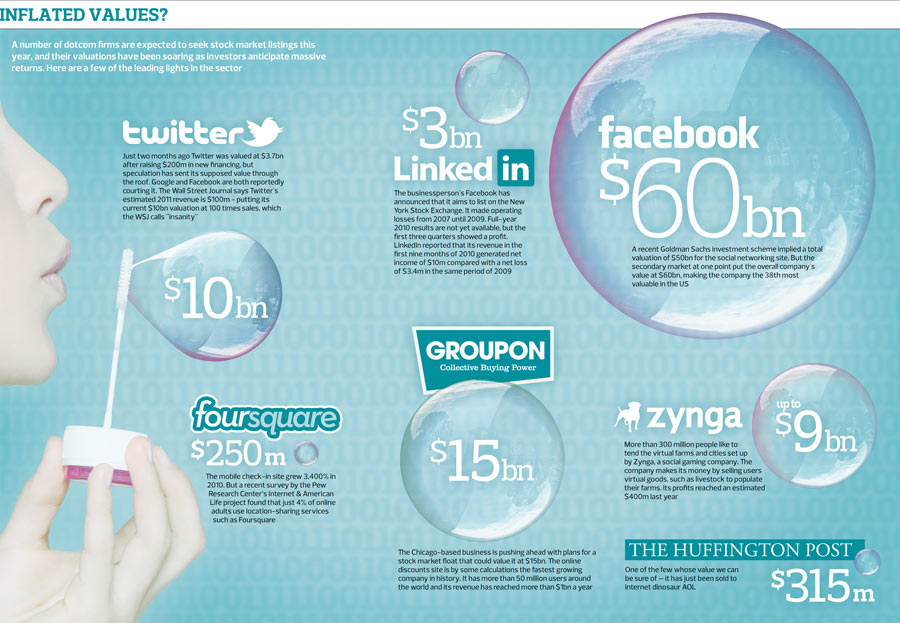Even if bloated valuations of Facebook and Groupon point to another bubble bound to burst, the Fed shouldn't head it off but prepare for the fallout

POSITIVE SIDE OF SPECULATION
Among those benefits are entrepreneurial risk-taking and the animal spirits of innovation. "I do not feel confident that a policy which, in the pursuit of stability of prices, output, and employment, had nipped in the bud the railway boom of the forties, or the American railway boom of 1869-71, or the German electrical boom of the [1890s], would have been on balance beneficial to the populations concerned," wrote the British economist Dennis Robertson in 1926. Arthur Rolnick, former head of research at the Federal Reserve Bank of Minneapolis and currently senior fellow at the Humphrey Institute of Public Affairs, agrees with the Robertsonian point of view: "Sure, there's speculation, but this is how we want markets to work," Rolnick says. "It's the way we innovate and bring new products to market."
Not all innovations are desirable, of course, as we've seen recently. Much of the whiz-bang financial technology that made the housing bubble possible turned out to be toxic. Still, even if economists can agree on a set of statistical guideposts for determining the madness of crowds, monetary policy is often too blunt a policy instrument. Sure, the Fed can always pop a bubble by sharply hiking the fed funds rate. But that will also stymie angel investors, venture capitalists, and other intrepid investors from funding profitable ideas bubbling up from university labs and corporate research departments.
"The Fed raising the fed funds rate to deal with a bubble in one sector of the economy isn't very smart," says David Laidler, economist at the University of Western Ontario. "Whether the problem is in high tech or in housing, you're using an economy-wide instrument to deal with it, which isn't wise."
THE CANADIAN MODEL
The solution, many economists agree, is for the Fed to place a far greater emphasis on regulatory initiative than monetary policy when confronting bubbles.
Take the new mortgage rules announced by Canadian finance minister Jim Flaherty on Jan. 17. For the second time in less a year, the Canadian government acted to lean against ballooning consumer debt in a low interest rate environment to "protect the stability of the economy." In sharp contrast, when the stock market entered nosebleed territory in the late 1990s, the Fed ignored calls to raise margin requirements in the stock market, a targeted regulatory move.
During the real estate bubble, federal regulators had plenty of tools at their disposable to cut short the widespread abuses. Edward Gramlich, the late Federal Reserve governor, repeatedly warned about abuses in the subprime mortgage market and urged that the Greenspan Fed unleash investigators on lenders trolling for customers in poor neighborhoods and examine in detail their relations with major financial institutions. The Greenspan Fed, enamored with the elixir of deregulation, ignored his advice. "Regulators didn't do their job," says Rolnick.
Indeed, the Securities & Exchange Commission should step up its scrutiny of private investors and company valuations in the growing trading market for private share offerings of such marquee high-tech companies as Facebook, Twitter, and LinkedIn. Even more important, the Fed needs to exercise the extra oversight powers it got in the Frank-Dodd financial services reform legislation last July. (And Congress should avoid watering down the rules and regulations.)
Here's the thing: Plenty of mobile Internet companies, social networking firms, and other information technology companies will get funded over the next few years. Many of them will fail. That's capitalism. Regulators need to concentrate on preventing major financial institutions from feeding the frenzy and putting the taxpayer at risk. That's regulatory prudence. Stay tuned.
Is this the start of the second dotcom bubble?

No comments:
Post a Comment
Please b.Logictive! :)